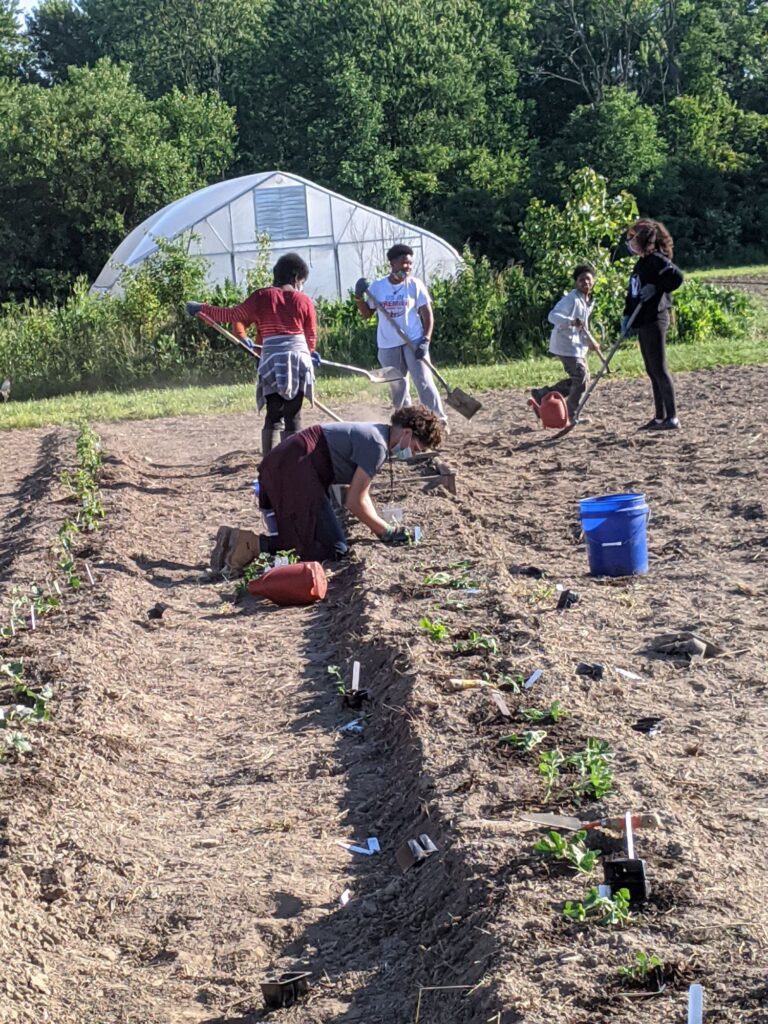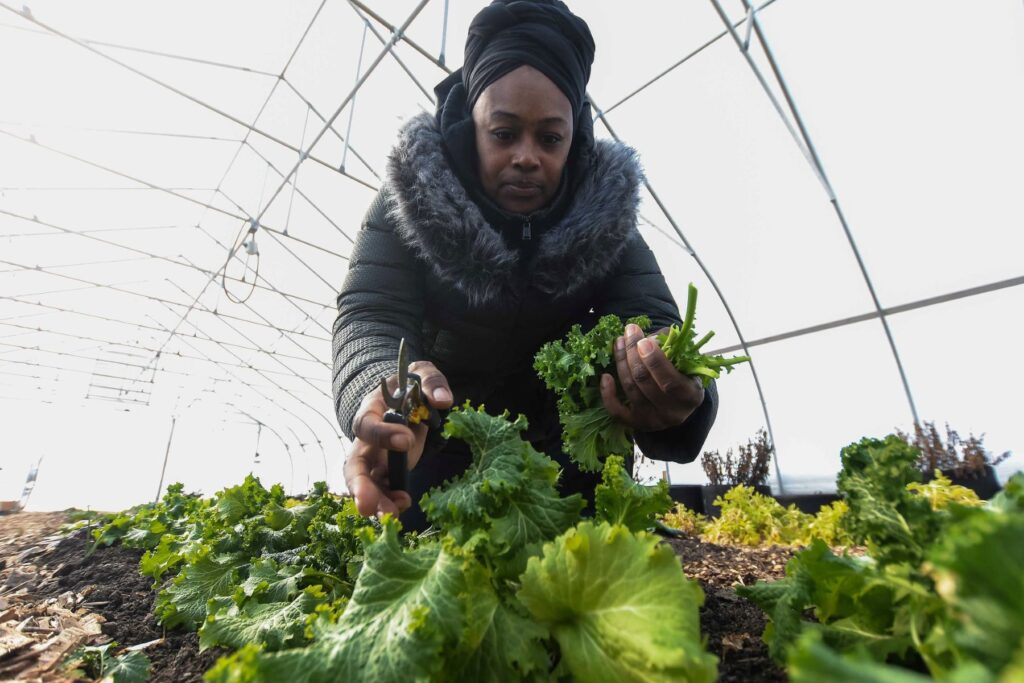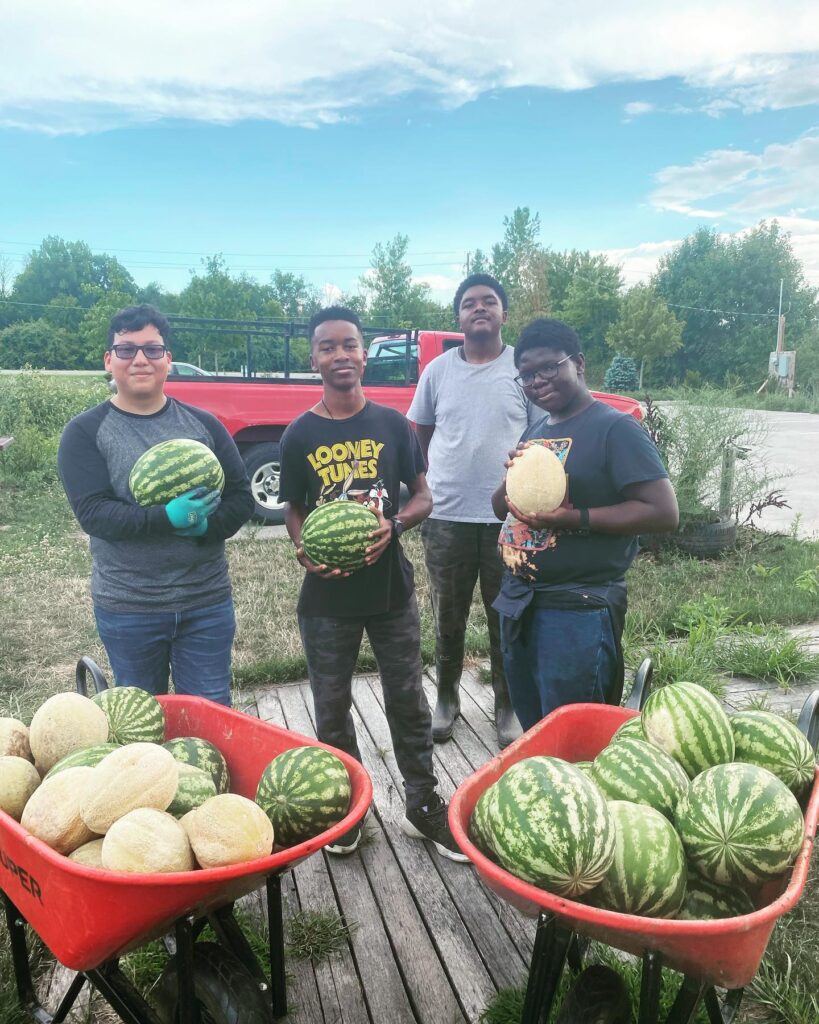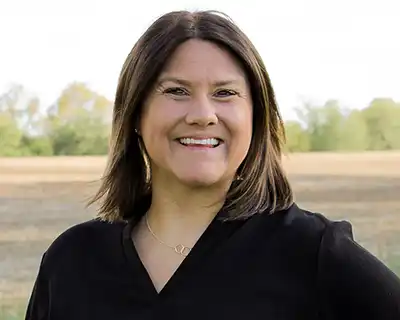Editor’s note: America’s Conservation Ag Movement has embraced farmer-to-farmer knowledge transfer as a key pillar in the strategy to accelerate regenerative ag practice adoption. At the center of the farmer learning communities, exceptional farmers have stepped forward to lead these efforts in their communities. These individuals are leaders in their own innovation and implementation of practices and programs that fit for their unique farm operation and help achieve the goal of continuous improvement. This profile is part of a series of that will highlight these Conservation Stewards, their farms, and their conservation practices throughout the year.
A palpable excitement is percolating through Lawrence Community Gardens on a warm day in mid-July as junior-high and high-school students arrive at the 7-acre urban farm in Indianapolis. It’s graduation day. About 20 kids from the community have spent their summer participating in a Junior Master Gardener program, which provides daily curriculum that teaches students to grow, market and distribute their own produce.
This is Sharrona Moore’s legacy, more than providing fresh produce for a community that would otherwise be an urban food desert. More than being a flourishing staple for neighbors who she helps understand the relationship between fresh food and health, or the backyard gardens that have proliferated throughout the nearby yards. Moore beams when she talks about her students and the role she plays in educating the next generation of farmers.
“My greatest accomplishment is gathering out front getting ready to receive their certifications,” she says. “That’s my greatest joy. That’s my biggest pride, to see them start with us and not really know where food comes from. Now they leave knowing the basics of how to grow, and they will go home and they will start it all over again. That gives me hope that we’ll have food for tomorrow. As I see it, our job is not just to grow food here, it is to grow farmers.”

Trust In Food: Why did you want to be a Conservation Steward with America’s Conservation Ag Movement?
Moore: I felt that it was important that I was able to become a Conservation Steward to share knowledge with other urban farmers. Urban farmers have been excluded from a lot of the conversation about conservation and from the conservation movement altogether because it’s smaller scale production. But as times are changing and we understand the impact that our small urban farmers are having on each individual city, then it becomes more important that we make them aware of how to do crop rotations, the value of mulching, the value of adding different conservation techniques, adding bees into the farm, and how they can access hoop houses because we don’t just eat 26 weeks out of the year, which is the typical growing period for Indiana. We eat 365 days, so we should be able to grow 365 days out of the year as well. That’s why I became a conservation steward, to spread knowledge and that wealth of information back to the urban growers in the city who really need it.
That’s important because it’s hard out here in the trenches. We rely on our support networks for things like how to control the squash beetles, or understanding different techniques on how to keep our crops watered in the drought we’re in right now. Everyone’s farm operation is different, and to understand how other farmers are doing it, to be able to come together and share and create extended family, that’s what’s important.

We have our farmer learning community groups once a month and we invite our NRCS staff out, as well as our Soil and Water Conservation District staff out to talk with our farmers about the different programs that they have, different resources that they can help with. Developing a relationship with those networks are so important. It’s not always about what you can get from the organization. Sometimes it’s about creating a friendship with a new individual that you would have never connected with because even if they can’t help me directly meet the needs on my farm, they can help point me in the right direction.
Trust In Food: What are some of the conservation practices you use on the farm?
Moore: We started off with cover crops. We grew oats in our largest field to just train our soil. We also create our own compost here. We have two medium-scale farmer compost bins, so we are taking all of our diverted waste, adding it to our compost bin with mulch, and we’re creating a beautiful black nutrient-dense loam and we’re using that back in our gardens.
That’s important because we have this beautiful hoop house where we are able to grow all year round. Further out in our fields, we use a lot of mulch in our walkways to hold the moisture and for weed suppression. And of course, we have bees because without bees we have no produce.
Trust In Food: How do the practices intersect with the community?
Moore: We have workshops here weekly that are open to the community, not just to the young people, but to the community at large, because we want them to understand some of the techniques that we are teaching our young people, the canning, dehydrating, how we’re preserving our food. We want to teach them emergency preparedness, but we’re also teaching them how to raise their own chickens, how to slaughter and butcher them, as well as cooking from the garden.
Our grocery stores in the area are not accessible by public transportation. And we have very low walkability scores in the neighborhood sidewalks. So I started this project with the vision that it would not only provide affordable access for this community to organic fresh foods, but also fight food insecurity by donations to the pantry in our neighborhoods regularly. We have a farmstand here on the site as well, so people can come here and purchase fresh food. Basically we wanted to meet the needs of the community right where they are financially and also be able to take the food directly from the farm to the people.
Trust In Food: Passing along this legacy not just to the next generation is a priority and passion of yours. What does that student program look like and why is it important?
Moore: Teaching kids how to grow food, how to care for the soil, how to build the soil, how to make compost, how to care for the bees, and how that all creates this circle of life is important for us. That’s something that they will take with them. It’s one part of their tool kits for life. It’s skill building and it’s character building. These kids learn more about the food system during the course of the summer than they probably will learn in any type of organized setting, from growing the food, learning how we distribute it to the community through our mobile farmers market and learning how we connect with and get our produce into the local grocery stores and pantries. There’s social responsibility there. It’s a responsibility each and every one of us have to care for our neighbor, and that’s what we teach them. Those are things that can’t be taught in school.

We start with a 5-week program in the summer, and those students get a stipend of $50 per week. To move forward in the program, they are nominated by their peers. If they move forward, then they will come back the next year and be paid $75 a week to work toward their certification, and they work 10 weeks in the spring, five weeks in the summer and 10 weeks in the fall to help with the harvest. Third-year students receive $100 a week, and once they’re earned those levels of certification, then they can be hired on with us as a farm hand, and we pay them $10 an hour.
In order to alleviate hunger in the United States, we must grow farmers. It’s not just enough to grow food. We have to plant that seed early in their development so that they understand that farming is far more extensive than just growing food. We talk to them about careers in farming, what types of other careers can we have? There’s irrigation, there’s fertilizer, there’s soil analysis, there’s composting, there’s research, there’s volunteerism. There are so many other avenues that they can pursue in the industry of farming if they don’t want to just get their hands dirty.
Trust In Food: As a relatively new operation, where do you go for technical support and resources you might need?
Moore: Developing a relationship with NRCS and the Soil and Water Conservation District has helped me get the tools I need to do the work here, and my relationship with our district conservationist has carried us a long way. I’ve had help with filling out applications for the hoop house, for instance. I’ve had help with deciding which trees that we needed to plant for our windbreak area. It’s just been a great experience because they help align me with other organizations in the area that can provide technical advice and resources.
If I had not reached out to these organizations, my project would not have grown as fast as it has. Some of the other farmers that I started with, they’re still slow-walking. I’ve been in the game now five years, and our project has exploded to the point where I can no longer manage it alone, and that’s the impact the NRCS is has on a project like mine. Developing a relationship with your local representatives is so important.



